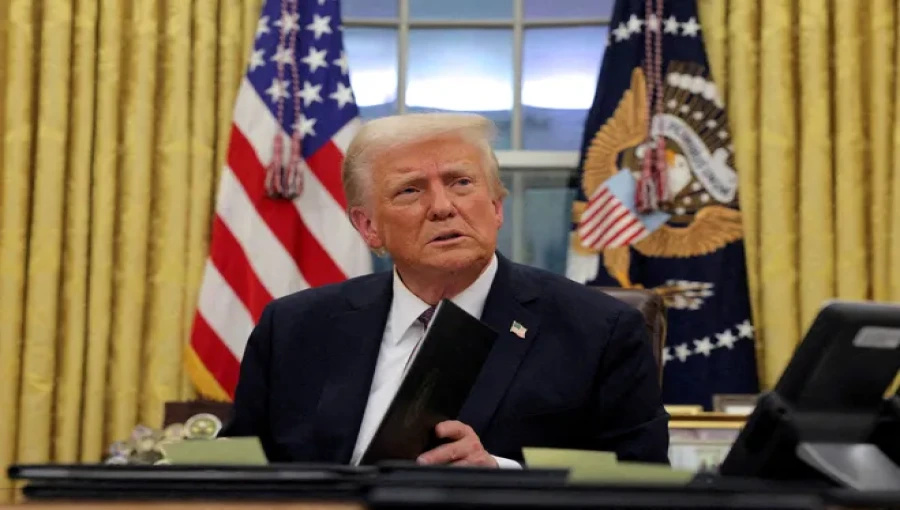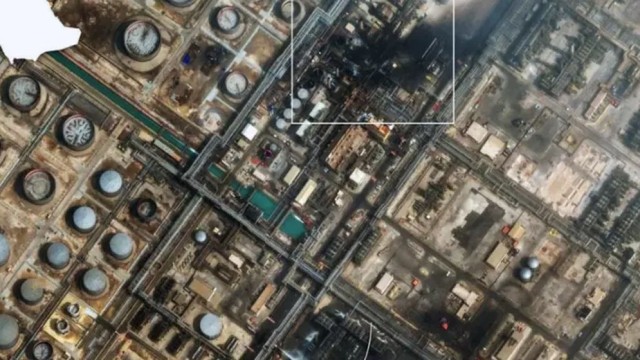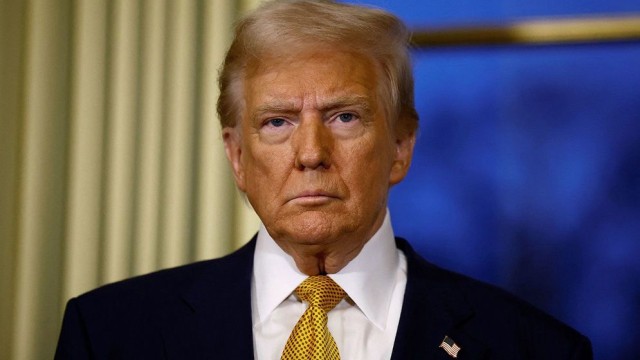Washington, Jan26, (V7N) - In a significant move by the Trump administration, the United States has announced a halt to foreign aid to all nations, except for emergency food assistance and military funding for Israel and Egypt. This decision, which was officially made on January 24, 2024, marks a major shift in U.S. foreign policy, underlining President Donald Trump's "America First" approach.
Key Details of the Decision:
New Restrictions on Foreign Aid: The decision was communicated in a memo from newly appointed Secretary of State Marco Rubio, who instructed the U.S. State Department to impose strict conditions on foreign assistance. Under these new rules, any new funding approvals or renewals will only be made after a thorough review process to assess whether the aid is aligned with the current administration’s goals and whether previous aid commitments have been fulfilled.
Impact on Various Types of Aid: The new directive affects all forms of U.S. foreign aid, including development assistance, humanitarian aid, and military funding. However, military aid for Israel and Egypt, as well as emergency food assistance for countries in crisis, will be exempt from this freeze.
Israel and Egypt’s Military Assistance: The U.S. has long provided substantial military aid to Israel, especially after the 1979 peace agreement between Israel and Egypt. Even under the new restrictions, this assistance will continue, particularly following the recent conflict in Gaza, which has prompted the U.S. to offer a more extensive military aid package to Israel. Similarly, Egypt, as a key strategic partner, will continue to receive military funding.
PEPFAR Program Could Be Affected: The U.S. has also expressed the possibility of suspending PEPFAR (President's Emergency Plan for AIDS Relief), a program that has been instrumental in combating HIV/AIDS, particularly in African nations. Launched in 2003 by President George W. Bush, PEPFAR has saved millions of lives by providing antiretroviral medications to people living with HIV/AIDS. This freeze could delay or halt the provision of life-saving medication to millions in developing countries.
Emergency Food Aid: While most foreign aid programs will be affected, the Trump administration has promised to continue providing emergency food aid to countries facing urgent food crises, including Sudan and Syria. This provision aims to alleviate immediate suffering in regions experiencing severe hunger and malnutrition.
Rationale Behind the Decision:
‘America First’ Policy: Rubio emphasized that under Trump’s foreign policy doctrine, the U.S. will prioritize its own national interests over traditional foreign aid commitments. This change is in line with Trump's broader strategy of reducing U.S. involvement in global matters that do not directly benefit American citizens.
Reassessment of Aid Effectiveness: Rubio pointed out that this suspension of aid will allow the government to conduct an internal review to assess whether past aid commitments have been effective and whether they align with Trump’s foreign policy objectives. The review will take place within the next 85 days, scrutinizing past foreign aid decisions and re-evaluating the necessity of continuing them.
Potential Consequences:
Impact on Ukraine: While Ukraine has received billions of dollars in military aid from the U.S. under the Biden administration to help defend against Russian aggression, this new directive could result in the suspension of any future military assistance, even as the war with Russia continues to escalate. This decision will have global ramifications, especially for countries dependent on U.S. military support.
Humanitarian Implications: Programs like PEPFAR and other health-related initiatives funded by the U.S. are vital to saving lives in developing nations, particularly in Africa. The suspension of these programs could lead to severe public health setbacks in regions already battling HIV/AIDS and other diseases.
Global Perception of U.S. Commitment to Development: The U.S. has long been regarded as the largest and one of the most generous contributors to global development and humanitarian aid. The suspension of these funds could diminish the country's influence in global development efforts, opening the door for countries like China to increase their presence in regions traditionally supported by U.S. aid. China has been more focused on resource extraction and infrastructure development rather than humanitarian aid, which could shift global dynamics.
Oxfam’s Criticism: Humanitarian organizations like Oxfam have expressed concern about this move, calling it a departure from the U.S.'s traditional role as a leader in international aid. They argue that reducing or suspending aid to struggling countries could exacerbate poverty and inequality around the world, leaving vulnerable populations without crucial support.
U.S. Foreign Aid in Context:
Historical Role: The U.S. has long been the world's largest donor of foreign aid, contributing more than $64 billion in 2023 alone. However, when adjusted for the size of the economy, countries like Sweden and Norway, and some other Scandinavian nations, contribute a larger proportion of their GDP to international aid.
Global Influence of U.S. Aid: For decades, foreign aid has been a key tool of U.S. foreign policy. It has been used to foster diplomatic relations, stabilize regions, and support economic development in low-income countries. The U.S. has also used foreign aid to promote human rights, democracy, and environmental protection. The Trump administration’s decision signals a fundamental shift away from these goals.
Conclusion:
While the U.S. remains a dominant player in global foreign aid, the Trump administration’s decision to suspend most foreign aid marks a significant departure from past policies. This move will have wide-ranging implications for both the recipients of U.S. assistance and for the country’s role on the world stage. Critics argue that it could harm global development efforts, particularly in health and humanitarian sectors, while proponents argue that it is necessary to prioritize American interests. Only time will tell how this policy shift will impact U.S. relations with the rest of the world and its reputation as a leading global donor.
END/WD/SMA/






























Comment: